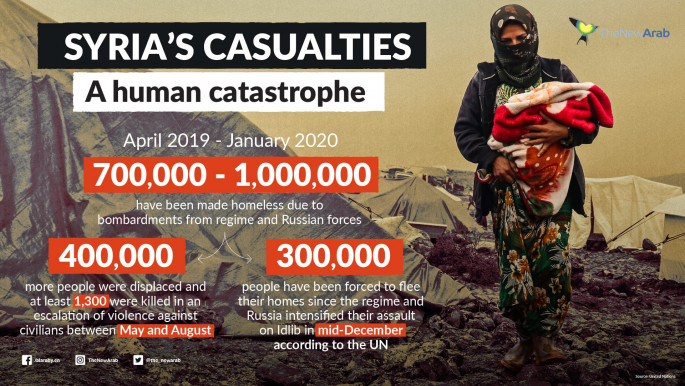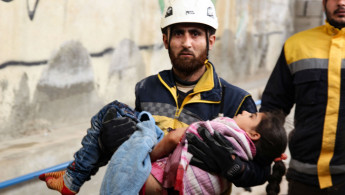Syria's White Helmets warn of 'humanitarian catastrophe' in Idlib as civilians await final onslaught
In the statement, the White Helmets said the regime had targeted the city of Maaret al-Numen and Hatanoutin towns in East Idlib. The bombardment followed a massacre in the city of Idlib Saturday where airstrikes killed 20 people, and injured 27.
On Monday, the Syrian regime forces violated a ceasefire in the northwestern Idlib governorate, while the humanitarian corridors that Russia claimed to have opened in the area were unused by civilians - photographs purporting to show this were demonstrated to be faked.
Local sources told The New Arab Syria correspondent that the Syrian regime forces bombarded artillery areas in the city of Maarat al-Numan, Talmans, and the western village of Deir in the south eastern countryside of Idlib, causing material damage to civilian property.
"The humanitarian catastrophe that Idlib faces today is perhaps the largest ever with the continued failure of Russia and the Assad regime to commit to the ceasefire," the statement read.
Residents are despairing that they have nowhere to go should the onslaught on the northern province continue.
"The situation is now at its worst in Idlib," said Qusay Noor, a photojournalist from the area. "Many of the residents of Maarat al-Numan and many others have been displaced to areas within Idlib. They live in uninhabitable camps and many families do not have tents and sit in the rain."
He added that the number of families displaced is very large and it is not possible for their needs to be provided for, and that constant bombardment is creating daily displacement from areas within Idlib.
"The areas there are very remote and the ground is covered in mud. Some relief societies are not even able to deliver bread to the camps," Noor said, adding that last week an aid organisation brought donkeys instead of cars to distribute bread in the area, but donkeys also struggled through the mud and took "several hours to reach some tents."
"Most people are heading to the Turkish border and sit near there." He explains that civilians are heading to the borders because they are safer areas, but think that it will be very unlikely that Turkey will open the border with Syria which has been closed since 2015.
"The world has stopped supporting them [refugees]...and the UN knows this well but they are not helping them," Qusay said.
Activist Mohammed al-Idlibi told The New Arab’s Syria correspondent that the regime’s actions aim to put "psychological pressure...with the aim for displacing civilians from the area entirely".
He added that southern and eastern Idlib have been "emptied" as a result of displacement of civilians towards the north to escape the bombing of regime and its allies.
The regime is also throwing leaflets calling on residents of the area to surrender.
"We live in a state of intense panic, fear of bombing, displacement, the advance of the army and the unknown fate... no safe place remains and airstrikes randomly bombard schools, hospitals, ovens and homes..." said Hiba, a student volunteering in Idlib City.
"We no longer think about our future and dream about beautiful things in our life, what we think about is what will happen to us? Will we survive or die? Will we be injured or displaced? No one knows and no one tries to help us."
She said that civilians were fleeing to the north of the province, but expressed fear that the bombardment would soon move to this region.
"If anyone comes to Idlib, they will notice that the northern regions are densely populated. Until now there are people sleeping in their cars and trucks. If the situation gets worse we would have to flee anywhere. Our fate is unknown."
Twitter Post
|
Hiba strongly disputed the Syrian regime and Russia's line that they are fighting extremist groups in the rebel-held province.
"The children have been killed in their schools; the men have been killed in their way home to bring food and household needs, the women have been killed in their homes when they prepare the meal to their family. Are there terrorists? " she said.
Mohammed Muharram, an aid worker in the province agreed that the prospects for north Idlib and the 2 million refugees displaced into the tiny area were bleak.
"The borders are closed, the displaced in the open, poverty, hunger, displacement and extreme cold. The north might be in danger if the militias of Iran, Assad and Russia attack and the bombing continues," he said, appealing to the international community to "help the children in Syria".
The White Helmets emphasised that attempts by the UN to allow aid to reach the area were "not enough", as it was failing to reach civilians who were being "systematically targeted".
"We call on the International Community to take full responsibility for protecting civilians in Idlib from any reactions or actions by Russia and the Syrian regime, and to stop the systematic bombing and war crimes against the Syrian people," the statement read.
Follow us on Twitter and Instagram to stay connected





 Follow the Middle East's top stories in English at The New Arab on Google News
Follow the Middle East's top stories in English at The New Arab on Google News
![The UAE is widely suspected of arming the RSF militia [Getty]](/sites/default/files/styles/image_330x185/public/2024-11/GettyImages-472529908.jpg?h=69f2b9d0&itok=Yauw3YTG)
![Netanyahu furiously denounced the ICC [Getty]](/sites/default/files/styles/image_330x185/public/2024-11/GettyImages-2169352575.jpg?h=199d8c1f&itok=-vRiruf5)
![Both Hamas and the Palestinian Authority welcomed the ICC arrest warrants [Getty]](/sites/default/files/styles/image_330x185/public/2024-11/GettyImages-2178351173.jpg?h=199d8c1f&itok=TV858iVg)